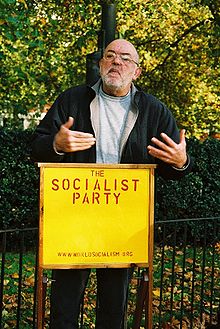Soapbox
A soapbox (German soap box ) is an improvised platform for a speaker in the open air. In England in particular, the word is also used metaphorically for the right to free speech . Hyde Park in London is known for the Sunday speeches that have been held in Speakers' Corner there since 1872, which originally mainly dealt with religious topics.
The right to speak freely about other, controversial topics was established in several sometimes violent disputes and is now considered a central aspect of British political culture. Some attempts to establish this in Germany as well failed, which Erhard Eppler, with reference to Carl Gustav Jochmann, attributed to the predominance of the written language, the lecture and the teaching style in Germany over the oral Anglo-Saxon public, debate culture and jurisprudence.
A modern form of “soapboxing” are blogs and other websites on which users post their own thoughts.
Historical example
In the election campaign for the British general election in 1992 , the conservative top candidate John Major managed to use a soapbox campaign to avert the presumed victory of Neil Kinnock's Labor Party in Great Britain. While Labor relied on professional election campaign staging, Major ran an intensive street election campaign with a variety of classic soapbox appearances, which earned him the election victory, as his election campaign was perceived as much more authentic and honest than that of his opponent.
See also
Web links
Individual evidence
- ↑ Erhard Eppler: Cavalry horses at the horn signal. About language and politics . Suhrkamp, Frankfurt am Main 1992, ISBN 3-518-11788-2 .
- ↑ BBC on this Day: 1992 - John Major climbs onto his soapbox
